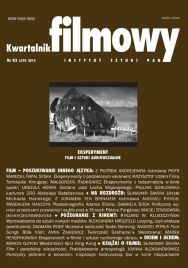"Ukryte" Michaela Hanekego jako eksperymentalny "dokument" performatywny.
Michael Haneke's "Caché" ("Hidden") as an experimental performative "documentary".
Author(s): Sławomir SikoraSubject(s): Theatre, Dance, Performing Arts
Published by: Instytut Sztuki Polskiej Akademii Nauk
Keywords: Haneke Michael
Summary/Abstract: The interpretation of the film leads the author to some basic conclusions. According to Sikora it can be concluded that (1) Haneke’s film should be interpreted through the paradigm of crystalline cinema, and not the organic one (G. Deleuze); (2) Haneke in a very sophisticated way blurs the distinction between what is internal and external, and thus blurs the distinction between what is “real” and what is “imagined” – that way both spheres are intertwined with each other (Möbius strip), when they refer to the reality; (3) this sophisticated game shows how difficult it can be to become aware of racism; (4) in effect the viewer is intellectually, sensually and “physically” forced to become aware of painful social issues (e.g. racism) – and that is the reason why this film can be considered to be an experimental performative “documentary”.
Journal: Kwartalnik Filmowy
- Issue Year: 2013
- Issue No: 82
- Page Range: 92-104
- Page Count: 13
- Language: Polish

